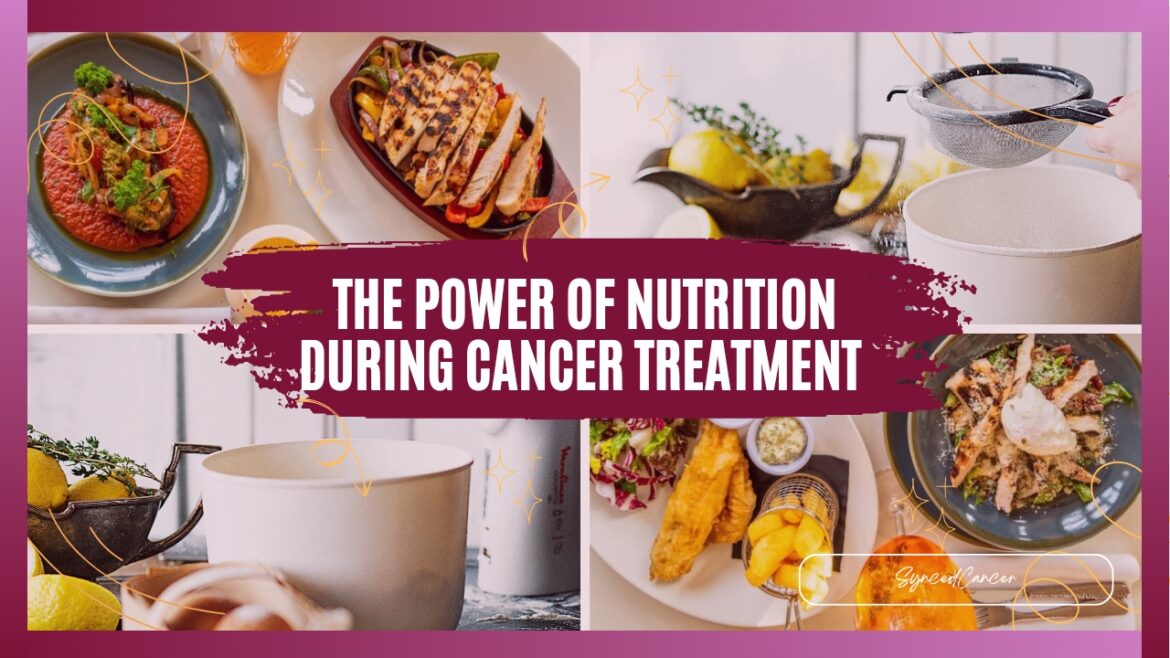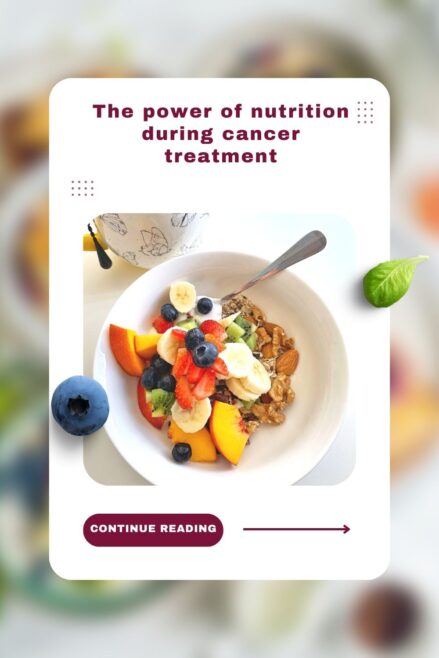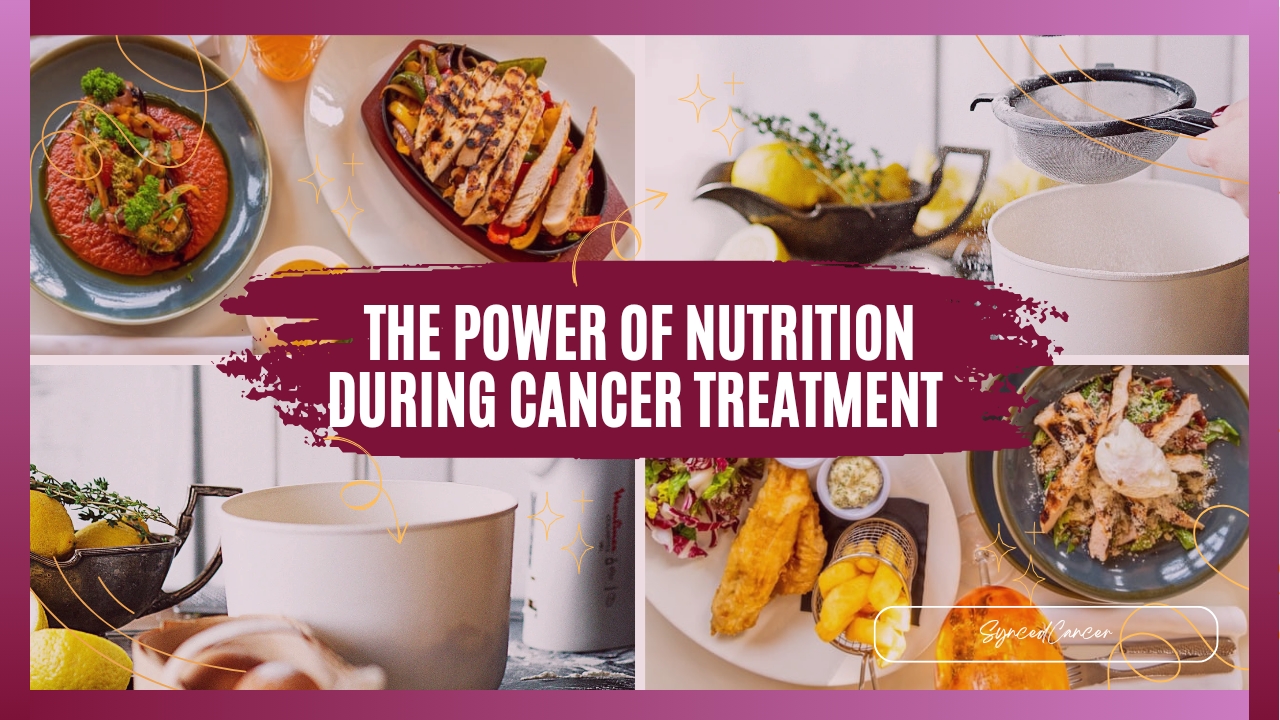Proper nutrition is important in maintaining our overall health and well-being. When faced with a cancer diagnosis, the importance of balanced nutrition becomes clear. As we combat this disease, it becomes evident that excellent nutrition provides essential support to our bodies, empowering them to combat cancer cells and withstand the demanding treatments that accompany it.
Cancer treatment did not only take toll on the body, it also impacts energy levels, weight, and overall well-being. However, maintaining good nutrition during cancer treatment crucial for supporting the body’s ability to tolerate treatment side effects, preserving energy levels, and bolstering the immune system. In this blog post, we’ll explore the importance of good nutrition during cancer treatment and how specific nutrients can play a vital role in supporting overall health.

The Role of Proper Nutrition in Mitigating Treatment Side Effects During Cancer Therapy
Good nutrition during cancer treatment plays a crucial role in supporting the body’s ability to tolerate the side effects. Cancer therapies such as chemotherapy, radiation therapy, and surgery can often lead to various adverse effects on the body, including nausea, vomiting, fatigue, loss of appetite, and weight loss. By focusing on a well-balanced diet tailored to individual needs, individuals undergoing cancer treatment can alleviate these side effects and improve their overall well-being.
- Nutritional support for managing nausea and vomiting: Certain foods and dietary strategies can help alleviate nausea and vomiting commonly associated with cancer treatment. For example, consuming small, frequent meals, staying hydrated, and opting for bland, easily digestible foods like crackers, toast, and rice can provide relief. Additionally, ginger and peppermint have been found to have anti-nausea properties and can be incorporated into the diet through teas, candies, or supplements.
- Energy and strength maintenance: Cancer treatment often leads to fatigue and weakness due to the body’s increased energy demands and decreased ability to absorb nutrients. Adequate calorie intake is essential to maintain energy levels and support the body’s healing processes. Focus on nutrient-dense foods such as lean proteins, whole grains, fruits, and vegetables to provide essential vitamins, minerals, and antioxidants necessary for optimal health and energy.
- Preventing malnutrition and weight loss: Malnutrition and unintentional weight loss are common concerns during cancer treatment and can compromise treatment outcomes and overall quality of life. It’s essential to prioritize nutrient-rich foods to prevent muscle wasting and maintain a healthy weight. Including protein-rich foods such as poultry, fish, tofu, beans, and dairy products can help preserve muscle mass and support immune function.
- Hydration and fluid balance: Staying hydrated is crucial during cancer treatment to prevent dehydration, maintain electrolyte balance, and support proper organ function. Certain treatments like chemotherapy can increase the risk of dehydration due to fluid loss through vomiting, diarrhea, or increased urination. Drinking plenty of water, herbal teas, broths, and electrolyte-rich beverages can help replenish fluids and prevent dehydration.

Importance of maintaining energy levels and a healthy weight
Maintaining energy levels and a healthy weight during cancer treatment is of paramount importance for several reasons, as it directly impacts the individual’s ability to cope with the challenges of the treatment process and contributes to overall well-being. Here are some importance of maintaining energy levels and a healthy weight.
- It helps in supporting treatment tolerance: Cancer treatments such as chemotherapy, radiation therapy, and surgery can be physically taxing and may lead to fatigue, weakness, and loss of appetite. Adequate energy levels are essential for the body to tolerate these treatments and recover effectively. Individuals with higher energy reserves are better equipped to withstand the side effects of treatment, including nausea, vomiting, and fatigue, and are more likely to complete their treatment regimens as prescribed by their healthcare providers.
- Promoting healing and recovery: Cancer treatment can take a toll on the body’s immune system and overall physiological function. Maintaining a healthy weight and adequate energy levels supports the body’s ability to heal and recover from the effects of treatment, including tissue damage, inflammation, and immune suppression. Nutrient-rich foods provide essential vitamins, minerals, and antioxidants necessary for cellular repair, immune function, and tissue regeneration, aiding in the recovery process and reducing the risk of complications.
- Preventing malnutrition and muscle wasting: Cancer treatment can disrupt normal eating patterns, leading to loss of appetite, changes in taste and smell, and difficulty swallowing. These factors increase the risk of malnutrition, weight loss, and muscle wasting, which can compromise treatment outcomes and overall quality of life. Maintaining a healthy weight through good nutrition during cancer treatment helps prevent malnutrition and preserves lean muscle mass, which is important for physical strength, mobility, and resilience.
- Enhancing quality of life: Fatigue and weight loss are common side effects of cancer treatment that can significantly impact an individual’s quality of life and emotional well-being. Adequate energy levels and good nutrition during cancer treatment can help alleviate these symptoms, improve mood, and enhance overall quality of life. By prioritizing self-care practices such as healthy eating, staying hydrated, and engaging in light physical activity when possible, individuals undergoing cancer treatment can maintain a sense of control over their health and well-being, fostering a positive outlook and greater resilience in the face of adversity.
Specific nutrients that can support your immune system
Some specific nutrients support the immune system during cancer treatment by enhancing immune function, reducing inflammation, and supporting overall health. Here are some key nutrients and their immune-supportive properties:
- Vitamin C:
- Vitamin C is a powerful antioxidant that helps protect immune cells from oxidative stress and supports the production and function of white blood cells, which are essential for fighting infections.
- During cancer treatment, vitamin C may help mitigate treatment-related side effects, such as inflammation and oxidative damage, and support overall immune function.
- Vitamin D:
- Vitamin D plays a critical role in modulating the immune response and enhancing the activity of immune cells, including T cells and macrophages, which help identify and destroy cancer cells.
- Maintaining adequate vitamin D levels is particularly important during cancer treatment, as deficiency has been linked to increased susceptibility to infections and poorer treatment outcomes.
- Zinc:
- Zinc is essential for the proper functioning of the immune system, including the development and function of immune cells and the production of antibodies.
- Adequate zinc intake may help reduce the risk of infections and support immune function during cancer treatment, especially in individuals experiencing zinc deficiency or undergoing treatments that deplete zinc levels.
- Omega-3 fatty acids:
- Omega-3 fatty acids, found in fatty fish, flaxseeds, and walnuts, have anti-inflammatory properties and may help reduce inflammation associated with cancer and cancer treatment.
- Incorporating omega-3 fatty acids into the diet may support immune function, improve treatment tolerance, and enhance overall health and well-being during cancer therapy.
- Protein:
- Protein is essential for the growth and repair of tissues, including immune cells, and plays a crucial role in maintaining a healthy immune system.
- During cancer treatment, adequate protein intake is important for supporting immune function, preserving muscle mass, and promoting recovery from treatment-related side effects.
- Antioxidants:
- Antioxidants, such as selenium, vitamin E, and beta-carotene, help neutralize harmful free radicals and reduce oxidative stress, which can impair immune function and contribute to cancer progression.
- Consuming a variety of antioxidant-rich foods, such as fruits, vegetables, nuts, and seeds, can help support the immune system and protect against the damaging effects of cancer treatment.
Conclusion
Good nutrition during cancer treatment is an essential component of cancer treatment and an investment in your well-being throughout your treatment journey. It helps to mitigate treatment side effects, maintain energy levels, and support immune function. By focusing on nutrient-dense foods and personalized dietary strategies, individuals undergoing cancer treatment can optimize their nutritional intake and improve their overall well-being. Working closely with a healthcare team, including a registered dietitian, can help individuals navigate the challenges of maintaining good nutrition during cancer treatment and improve their quality of life.



What do you think?
It is nice to know your opinion. Leave a comment.